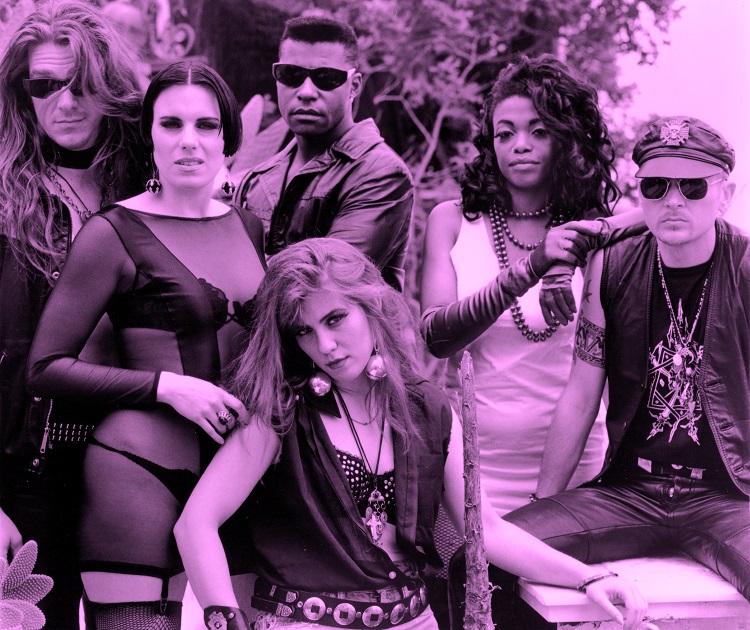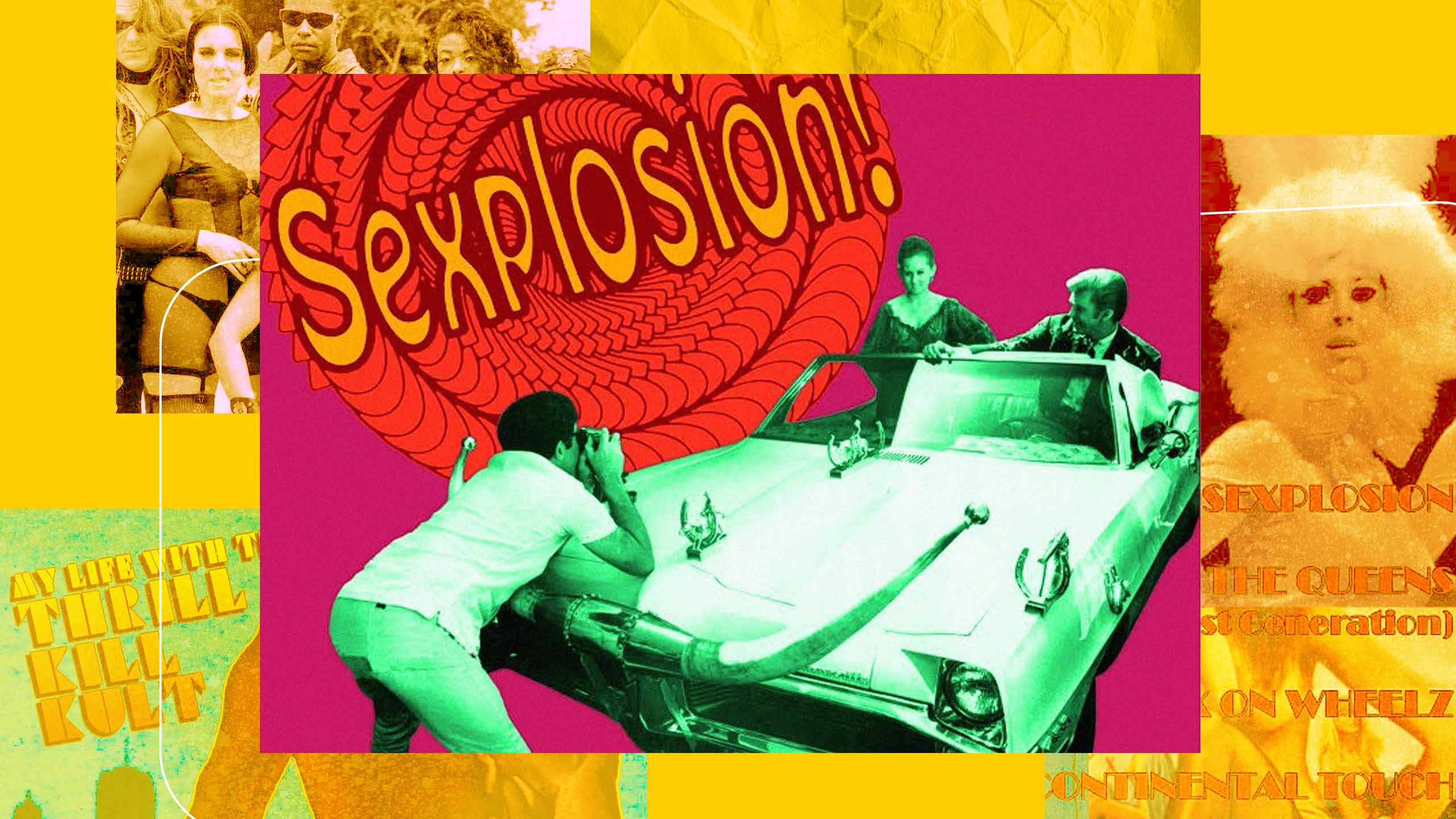I owe Claude Rajotte a debt of gratitude. For many young queers coming of age in Canada in the 1980s and ’90s, it was Patti Schmidt and CBC Radio’s Brave New Waves who introduced them to alternative music, but for me it was Rajotte, a French-Canadian DJ on Montreal’s CHOM-FM who would play two hours of strange and wonderful music every Monday night and tell me what I should be listening to.
I’d sit on the floor of my suburban bedroom, in front of my double-deck cassette player with my Record and Play fingers at the ready. Sometimes it would be blank cassettes I’d fill up with songs; other times it would be dusty albums I’d poach from the family collection to record over by placing Scotch Tape on the protective corners (sorry, Kenny Rogers). The music Rajotte played was different from anything else I’d heard on the radio. At times it was chaotic, surprising and angry; other times it was pensive, hypnotic and sad—but above all it was revelatory, like discovering a secret about yourself. It made me feel alive.
Back then, I didn’t have much money to buy music, but when I’d saved up enough from my allowance, I’d head down to Dutchy’s Record Cave on St. Laurent Boulevard—the store from which Rajotte would play the Top 10 bestsellers of the week—and take a gamble on an album. Sometimes it was a hit; other times it was a miss. Normally, I didn’t pay too much attention to record labels, but there was one that had a constant place on the charts—Chicago’s Wax Trax! Records, with its bold black-and-white logo of intersecting power lines. It was a safe bet that a Wax Trax! record would be good. So many of my adolescent discoveries were by artists on their roster: Ministry, KMFDM, Front 242, Revolting Cocks.
The band on their label that piqued my curiosity the most, however, was an outfit from Chicago with the bizarre name of My Life with the Thrill Kill Kult (TKK). I had recorded over part of my mother’s Bette Midler album with a remix of their song “The Days of Swine and Roses.” It was a particularly chaotic 10-minute track with frenetic synths, drunk bass and gritty vocals. I like to think of it as “Hot Lunch” from Fame, but for goths. Backup singers would incant, “Christian, zombie, vampire,” while lead vocalist Groovie Mann howled, “I am the father, the father of nothing.” It was manic, high-energy and incredibly danceable, as infectious as if you were bitten by said vampire (or Christian or zombie), and as rhythmic and consuming as sex.

Credit: Courtesy of Wax Trax! Records
Of course, I went out and bought the band’s two albums (I See Good Spirits and I See Bad Spirits and Confessions of a Knife). More subdued than the remix, the releases still had the elements I was looking for. The albums were dark and strange, yet lively and captivating. Still unaware of my own homosexuality, I recognized myself in the abstract lyrics of songs like “Do You Fear for Your Child?” and “These Remains.” Unlike the other industrial bands they were often grouped in with, there was a welcome sense of humour in TKK’s recordings. Yes, they were singing about darkness, Satan and the occult, but they were doing it with playfulness and sarcasm. With tracks like “Kooler than Jesus” and “Nervous Xians,” they were poking fun at religion, and this former altar boy could not have been more charmed. It felt freeing listening to TKK. It was ritualistic, it was outsider, it was underground. Nothing was sacred, but my soul was not at risk from listening to them. Rather, unbeknownst to me, the band had started the process of liberating my soul. They weren’t promoting devil worship, but rather, hedonism. A celebration of all that life had to offer, and a desire to not take things too seriously—much of this came through the wealth of samples in their music, from cult films like A Virgin Among the Living Dead, Female Trouble and The Lost Boys (Kiefer Sutherland’s vampire whisper, “Be one of us,” closes out “Universal Blackness”).
“It was ritualistic, it was outsider, it was underground.”
As much as I loved these two albums, TKK didn’t solidify in my Top 10 until they released their 1991 LP, Sexplosion! The band celebrated the album’s 31st anniversary last summer with a new remastered version and a pink vinyl edition of the recording, plus bonus tracks (the pandemic forced them to miss their milestone 30th anniversary).
Like most of their fans back in 1991, I was excited when I heard the lead single from Sexplosion! play on the radio. The song, “Sex on Wheelz,” which would end up in the Ralph Bakshi film Cool World, was a banger, and I looked forward to hearing the rest of the album. It took me a while, though, to buy it. I remember it being expensive: $18.99 for the cassette. The album’s cover had an outrageous photo of Bettie Page in a 1950s-style bathing suit doing a high kick in water with the word “Sexplosion!” lit up in loud neon lights.
After I finally purchased it, I ran home for a listen. I couldn’t have been more disappointed. The album didn’t have the sinisterness I had come to expect from their previous releases. It almost sounded like (gasp!) a dance album! There were horns and saxophones! And that was not something I wanted from my music. Back to The Cure I went.
But then, something happened.… About a year or so later, I started to realize that my lusting after other men wasn’t a phase, and soon I found myself sneaking off from my evenings out with friends at Montreal’s alternative bars like Foufounes Électriques and La Nausée to go to the gay clubs down the street. Like the music I was listening to, these unfamiliar spaces were surprising and affirming, creating so much possibility for me in life when I had been left uninspired by more mainstream choices. However, if I did want to spend time in these dark boxes of sexual possibility, I’d have to listen to dance music. So I’d go and sit at the bar, out of place in my black pants, Doc Martens and concert T-shirts, and try to find the beat (or a man). Unfortunately, I wasn’t very good at finding either.
Living in the suburbs, it was not every night that I could make it into the city, so I soon found myself listening to Sexplosion! at home because it reminded me of the sounds I heard in gay bars. Not that there was anything blatantly homosexual about the recording, but there was a kind of lasciviousness to it—a peep show, Blueboy magazine, underground element. There were 11 songs on my cassette and in each one I could hear the disco ball turning, the drag queens getting ready for their show. For Sexplosion!, TKK had replaced their devil horns with leather chaps, and their obscure Italian horror film samples with breathy honey-tinged dialogue from sexploitation films. The basic elements were still there—the synths, the sense of play, the vocals—but the rest was a radical departure. These songs were lustful, fuelled by sexy horn blasts, house music beats, runaway piano and soaring female vocals. Each track offered the listener a genderless, open-ended fantasy about love, sex and desire to project themselves into.
For example, “A Martini Built for 2” is a lounge-inspired lament of being stood up at a bar, while “Leathersex” delves into an almost religious worship of kink. “Mystery Babylon,” is a frisky romp featuring samples from real-life 1960s NYC sex workers, while “Princess of the Queens (The Lost Generation)” pairs sexual role-play with the joyful vocalizations of house diva Shawn Christopher (backup singer for Chaka Khan). Each track is over the top and camp as fuck, paying homage to the erotic power of one’s own dark secrets and libidinous confessions; and I, too, found power in my own secrets while listening to the cassette over and over in my bedroom.
Soon, I became obsessed with the band and would read whatever interviews I could find. I learned that TKK was formed in 1987 in Chicago by musicians Frankie Nardiello (Groovie Mann) and Marston Daley (Buzz McCoy). The two met while touring with Ministry and bonded over a shared love of foreign horror films. The duo then decided to make their own trashy B-movie in the style of John Waters and Russ Meyer that would be called My Life with the Thrill Kill Kult. Although the film was never completed, Buzz shared the music they had composed for the soundtrack with Wax Trax! Records owners Jim Nash and Dannie Flesher, where Buzz also worked in shipping. These recordings ultimately became the band’s first EP.
“It seemed like such a happy family of freaks and weirdos, with Groovie and Buzz as their daddies. I would have gladly run away to join them.”
For the longest time, I could never tell how many people were in TKK. My December 1993 issue of Alternative Press portrayed the group as about a dozen people, all of them lounging around a long table with Groovie in the middle, not unlike Jesus at the Last Supper. In an interview, Buzz said that most of the people in the band were just their friends or the people they hung out with. Their backup singers, the Bomb Gang Girlz, started out as waitresses or bartenders at their local watering holes. It seemed like such a happy family of freaks and weirdos, with Groovie and Buzz as their daddies. I would have gladly run away to join them.
In a 1995 interview with Ray Gun magazine, I finally learned that Groovie and Buzz were gay. And then it hit me—of course they are! How could have I ever thought that the two of them weren’t queer in some way? But back then, we had to look for bread crumbs in our music. Jimmy Somerville may have been out, but I had no assurances that Morrissey or Marc Almond or the Pet Shop Boys shared any of my tastes beyond musical ones. At the time, queer musicians mostly left the statements about their sexuality coded in their music. And I did the same with the music I listened to.
It took me a while to feel comfortable enough to come out to my friends in the alternative scene. There was always a lot of machismo in the mosh pit, and I would often hear straight men with Robert Smith–style hair gossip about the sexuality of others. In the early ’90s, places like Foufounes Électriques and La Nausée never felt like safe spaces for me the way that K.O.X. and Sky did. Finally learning that TKK’s leaders were queer made me feel much less alone.
Years later, I would also learn that CHOM’s Claude Rajotte was gay, and that Jim and Dannie, the owners of Wax Trax! Records, were a couple (their story is fascinating on its own). I find it so interesting that all these men—who brought so much music, so much joy, into my life—ended up being not so dissimilar to me in many ways. I didn’t realize it at the time, but I suppose I saw my own creative and sexual proclivities in theirs—invisible and unspoken, but it was in their music.
In the same interview where Buzz came out, he described the band’s philosophy. “TKK means the thrill killing of the ideology of cult—be yourself,” he said. “You don’t need cults, you don’t need organizations, religions, families, superstitions, taboos, anything except your own self.” It’s such an important thing for a young queer kid, from any era, to hear.


 Why you can trust Xtra
Why you can trust Xtra


